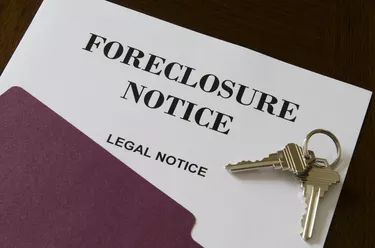
A loan is impaired when it is not likely the lender will collect the full value of the loan because the creditworthiness of a borrower has fallen, according to MyCAsite.com. The lender will pursue either restructuring or foreclosure as a result of the impaired status of the debt. Further, the lender must report the debt as impaired on any of its financial statements.
Definition
Video of the Day
The impairment amount of a loan is defined in mathematical terms. The lender calculates this amount by subtracting the amount expected to be recovered on the loan from the initial book amount of the loan. For example, if a lender issues a mortgage for $500,000 but expects to recover only $230,000, the impairment amount would be $270,000.
Video of the Day
Alternate Terms
Impairment may be called "delinquency" or "default" in common language. Delinquency means enough time has passed since the payment was due for the lender to suspect the payment will not be made. Default means the borrower has failed to meet the terms a lender provided to restore a loan from delinquency. In both cases, the loan would be considered impaired if the lender feels there is not evidence the debt will be collected based on the borrower's financial status, credit status and other factors.
Function
Generally Accepted Accounting Principals (GAAP) are rules that require lenders to report impaired loans. This gives customers, investors and credit raters a full picture of the lender's financial standing. A lender with too many impaired loans and not enough loans in good standing could be at risk of insolvency, a term used when a bank goes bankrupt.
Restructuring
A lender can choose to restructure an impaired loan. This gives the borrower more flexible terms to meet loan payments. Lenders may choose to restructure impaired debt to recover the largest amount possible from the borrower, reducing the total impairment amount.
Foreclosure
A lender may also choose to foreclose on collateral to recover from impairment. If the asset is valued higher than the impaired amount of the loan, the lender may eventually profit on the debt. For example, if the $500,000 mortgage on the loan impaired at $270,000 went into foreclosure, the lender would profit if the value of the home was greater than the $270,000 impaired amount.